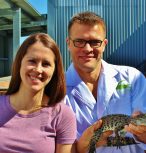DNA reveals the past and future of coral reefs
New DNA techniques are being used to understand how coral reacted to the end of the last ice age in order to better predict how they will cope with current changes to the climate. James Cook Univer

From 2005 to 2022, the main node of the ARC Centre of Excellence for Coral Reef Studies was headquartered at James Cook University in Townsville, Queensland (Australia)








Abstract: Many recent studies have linked CO2 exposure in fish to a variety of downstream consequences and sub-lethal effects. In a recent review article in the American Journal of Physiology (AJP; 2014), we summarized the literature on ocean acidification exposure in fish from a physiological viewpoint with the intent of identifying patterns and underlying mechanisms associated with significant impacts. Fish are known to be effective acid-base regulators and readily defend pH in bodily fluids, leading to the perception that this compensation confers tolerance. However, the compensated stated involves elevated carbon dioxide gas (pCO2) and bicarbonate buffer (HCO3-) in extracellular and intracellular fluids, a new steady state that has been recently hypothesized to be responsible for a large number of downstream consequences and tradeoffs. This theme, along with suggestions for future research directions will be the topic of discussion for this seminar.
Martin Grosell, PhD, is the lead PI and director of the research consortium RECOVER. Dr. Grosell is a Maytag professor of ichthyology with specialty in environmental physiology and toxicology at the University of Miami’s Rosenstiel School of Marine and Atmospheric Sciences (RSMAS) in the Department of Marine Biology and Ecology. Areas of expertise include trace metal homeostasis and toxicity, oil and PAH toxicity, respiratory gas exchange, cardiovascular physiology, acid-base balance, and osmoregulation in reptiles, fish and invertebrates. Physiological endpoints considered by Grosell’s group span, gene expression, enzymatic activities, immunohistochemistry, embryonic development, water and solute transport by cells and epithelia, respiratory gas exchange, whole animal homeostasis of salt, water and pH, as well as exercise physiology. Dr. Grosell obtained his MSc (1993) and PhD (1997) from the University of Copenhagen, Denmark, at the August Krogh Institute.
Rachael Heuer is currently a PhD student at the University of Miami Rosenstiel School of Marine and Atmospheric Science (RSMAS). Although Rachael is broadly interested in how ocean acidification affects acid-base balance in marine fish, the majority of her research examines potential impacts of CO2 on intestinal transport physiology at the whole-animal, tissue, and cellular level of organization. Rachael earned her BSc in Zoology in 2006 from the University of Florida and is currently in the final year of her PhD as a National Science Foundation Graduate Research Fellow under the direction of Dr. Martin Grosell.
New DNA techniques are being used to understand how coral reacted to the end of the last ice age in order to better predict how they will cope with current changes to the climate. James Cook Univer
A new study on the effects of climate change in five tropical countries has found fisheries are in more trouble than agriculture, and poor people are in the most danger. Distinguished Profess
James Cook University researchers have found brightly coloured fish are becoming increasingly rare as coral declines, with the phenomenon likely to get worse in the future. Christopher Hemingson, a
Researchers working with stakeholders in the Great Barrier Reef region have come up with ideas on how groups responsible for looking after the reef can operate more effectively when the next bleaching
Abstract: As marine species adapt to climate change, their heat tolerance will likely be under strong selection. Individual variation in heat tolerance and its heritability underpin the potential fo
Abstract: The Reef Ecology Lab in KAUST’s Red Sea Research Center explores many aspects of movement ecology of marine organisms, ranging from adult migrations to intergenerational larval dispersal
Abstract: Macroalgal meadows are a prominent, yet often maligned component of the tropical seascape. Our work at Ningaloo reef in WA demonstrate that canopy forming macroalgae provide habitat for ad
Abstract: Sharks are generally perceived as strong and fearsome animals. With fossils dating back at least 420 million years, sharks are not only majestic top predators but they also outlived dinosa
Abstract: Connectivity plays a vital role in many ecosystems through its effects on fundamental ecological and evolutionary processes. Its consequences for populations and metapopulations have been
Abstract: Evolution of many eukaryotic organisms is affected by interactions with microbes. Microbial symbioses can ultimately reflect host’s diet, habitat range, and even body shape. However, how
Abstract: The past few years have seen unprecedented coral bleaching and mortality on the Great Barrier Reef (GBR) but the consequences of this on biodiversity are not yet known. This talk will expl